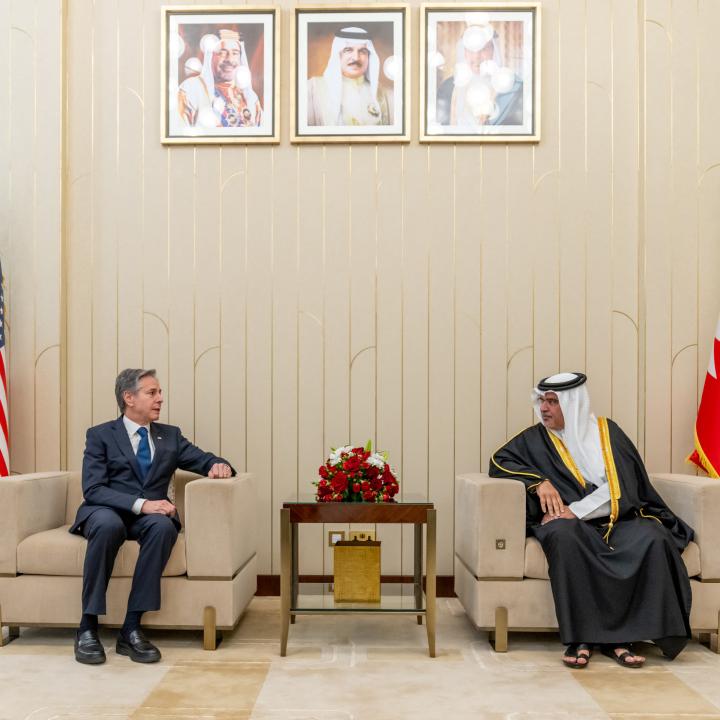
- Policy Analysis
- PolicyWatch 3928
U.S.-Bahrain Ties One Year After the Strategic Partnership Agreement

Two veteran ambassadors discuss bilateral efforts in the security, economic, and technology sectors, noting the agreement’s potential as a template for other countries in the region.
On September 9, The Washington Institute held a virtual Policy Forum with Ambassadors Steven Bondy and Sheikh Abdulla bin Rashid Al Khalifa. Bondy is the U.S. ambassador to Bahrain and former charge d’affaires and deputy chief of mission at the U.S. embassy in the United Arab Emirates. Sheikh Khalifa is Bahrain’s ambassador to the United States and former governor of the kingdom’s Southern Governorate. The following is a rapporteur’s summary of their remarks.
Steven Bondy
The Comprehensive Security Integration and Prosperity Agreement is the latest manifestation of the closeness of the U.S.-Bahrain relationship. C-SIPA is intended to strengthen bilateral strategic cooperation across defense, economic, and technology sectors by developing trade and investment links, strengthening people-to-people ties, and reinforcing shared values. At its core, C-SIPA showcases a shared global threat assessment and allows both nations to stand publicly for shared principles, including a rules-based international order and respect for borders, sovereignty, and freedom of navigation.
C-SIPA offers an innovative model for bilateral security cooperation by expanding beyond the defense apparatus into key economic and technology sectors. Economic growth and national security are inextricably linked, and Bahrain offers an open investment environment ideal for “friendshoring”—a term coined by Treasury Secretary Janet Yellen that denotes an approach to strengthening U.S. economic resilience by “diversifying supply chains across a wide range of trusted allies and partners.” Looking ahead, deeper economic and technological cooperation will be a key focus of the bilateral partnership.
The challenges that have emerged from the Hamas-Israel war have brought the United States and Bahrain closer together and reaffirmed America’s commitment to the Middle East. Bahrain was the only Arab or Muslim country to publicly join Operation Prosperity Guardian, a U.S.-led multinational security coalition formed in December 2023 to address regional maritime security challenges and ensure freedom of navigation. During this crisis, the United States has demonstrated its ability to move people, systems, and capabilities in and out of the region to respond to emerging threats and shifting challenges.
Expanding C-SIPA to include other like-minded countries remains a core bilateral objective. The agreement is not targeted against any particular nation—rather, it is intended to provide a framework for countries that support shared principles to formalize their mutual commitments. C-SIPA offers an innovative opportunity for such partners to contribute to a new regional security architecture and form a trusted network for defense, economic, and technological integration.
Sheikh Abdulla bin Rashid Al Khalifa
The signing of C-SIPA follows a long history of reliability, dependability, and enduring partnership between the two countries. Bahrain already hosts the headquarters of the U.S. Naval Forces Central Command and the Fifth Fleet, including around 9,000 U.S. military personnel. Yet C-SIPA provides a new blueprint for bilateral relations and an innovative platform for increased cooperation and integration across three key sectors: defense and security, economy and trade, and science and technology. Progress has already been demonstrated through several notable successes, including the approval of a $500 million loan guarantee by the Export-Import Bank of the United States to support a range of Bapco Energies projects in Bahrain.
Shortly after the signing of C-SIPA, Bahrain lost several military personnel in an attack by the Yemeni Houthis. Although there is a price to pay for creating peace in the region, the Middle East cannot afford further escalation. Partnerships like C-SIPA are crucial for enhancing Bahrain’s ability to build up capabilities and protect the kingdom’s critical infrastructure from emerging threats. The decision to join Operation Prosperity Guardian showcases Bahrain’s commitment to the bilateral strategic partnership and the shared values reflected in C-SIPA, including the protection of airspace and maritime security.
To advance higher economic and technological integration, Bahrain is looking to create new sectors that can facilitate the needs of regional and international partners and help the kingdom position itself as the front-runner for U.S. investments in the Middle East. As industries digitize, Bahrain can serve as a trusted hub for data storage and cloud infrastructure. C-SIPA provides a unique platform for higher integration along critical supply chains that can help counter conventional and unconventional threats, including cyber and network attacks.
Looking ahead, Bahrain will seek to move C-SIPA from an executive agreement to a formal treaty, thereby enhancing cooperation and furthering the agreement’s aims. Article 8 of C-SIPA was deliberately left open-ended to encourage other nations to join the agreement and contribute to the creation of a new regional security architecture. C-SIPA provides a valuable model of the potential that such partnerships hold for boosting prosperity beyond the scope of defense cooperation alone.
This summary was prepared by Sydney Hilbush. The Policy Forum series is made possible through the generosity of the Florence and Robert Kaufman Family.




